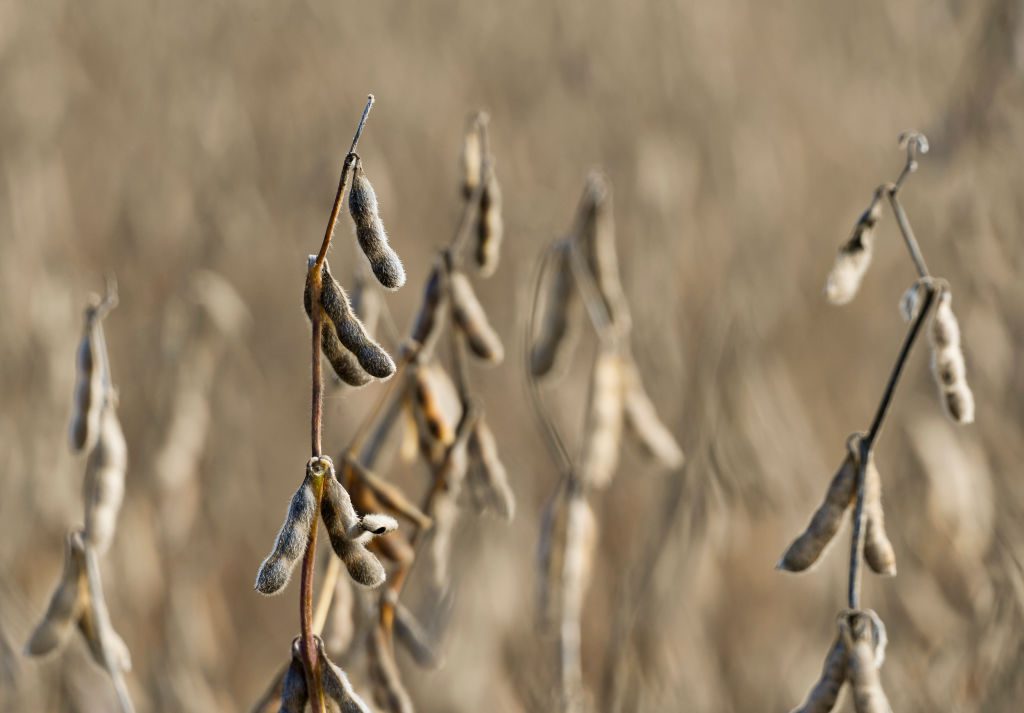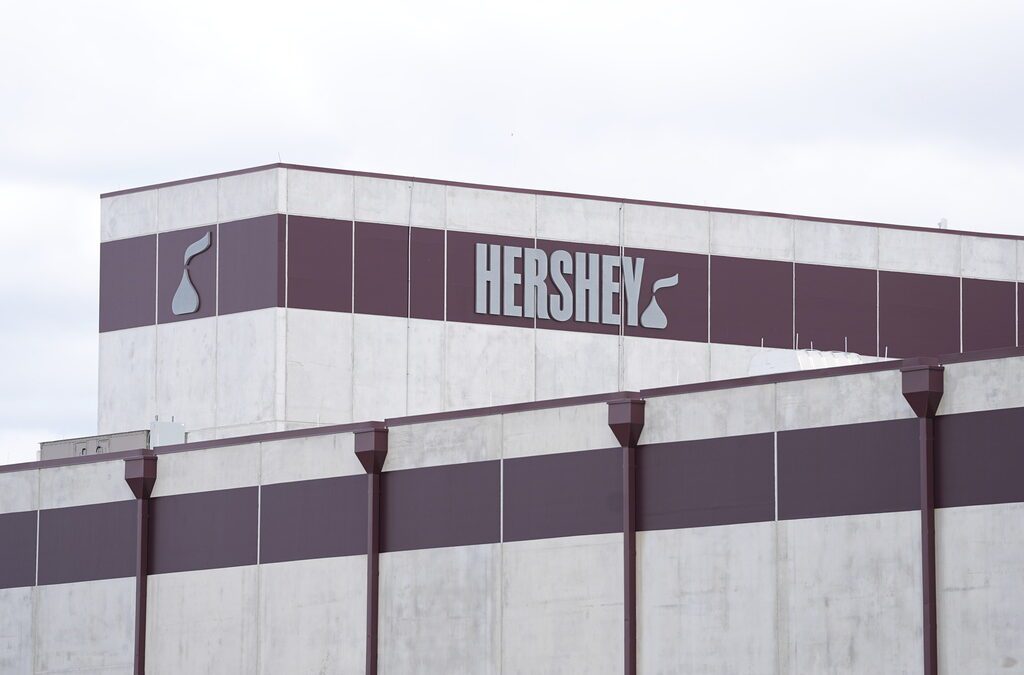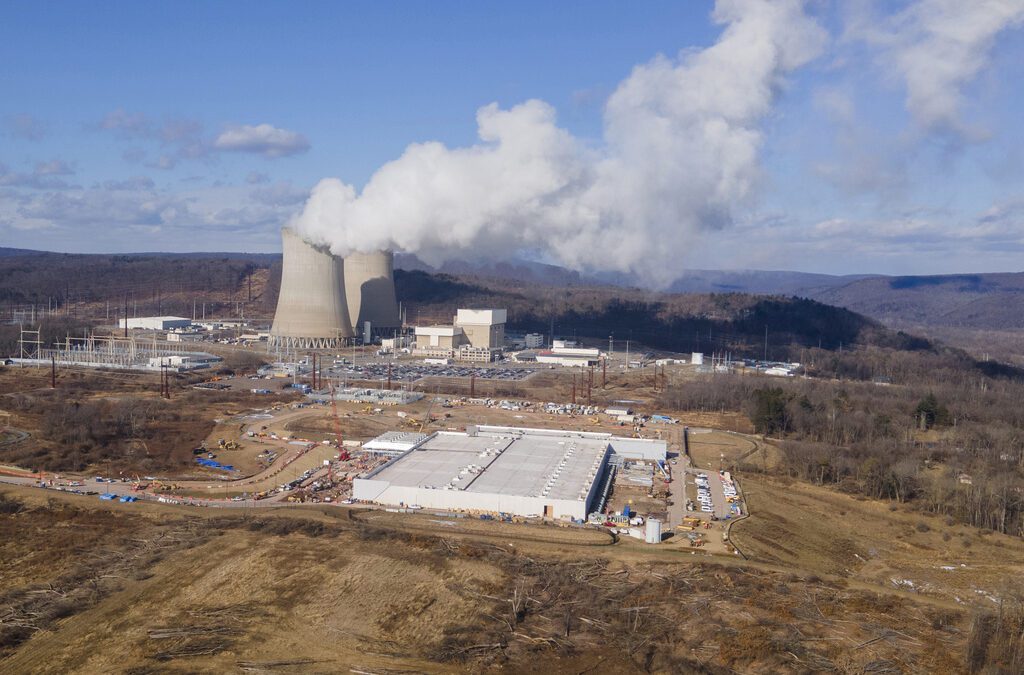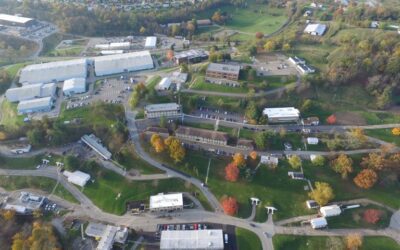
A field of soybeans in Pennsylvania. (Photo by Ben Hasty/MediaNews Group/Reading Eagle via Getty Images)
A Chinese boycott of U.S. soybeans is only the latest issue facing farmers. Labor shortages, soaring equipment costs and unpredictable weather have also taken their toll.
Mike Reskovac was starting the harvest at his family farm in Uniontown, Fayette County, later than he’d hoped.
Late-season rain meant he had to delay it about a week, since soybeans need to be dry when they’re harvested. Then, Thursday morning, Reskovac discovered two bearings that needed replacing in his combine. That meant calling dealers and suppliers, driving four hours round-trip to pick them up, shelling out $200 and installing them himself. He’d get to the field in the afternoon, and be at the harvest until after the sun went down.
“They always say farmers wear many hats because we’re an agronomist, a mechanic, a weatherman, an equipment operator or whatever,” Reskovac said.
Despite the headaches, there’s still no job he’d rather do. Reskovac, 45, a first generation farmer, learned the trade working on a neighbor’s dairy farm when he was young. When that owner retired, he took over a chunk of the land, and now runs a family farm business with his wife, Sheilah.
Reskovac, a recently appointed member of Pennsylvania’s Soybean Board, hopes it’s a business — and passion — he can hand down to his two sons. He’s already teaching his oldest, 9, how to operate the combine.
“If it’s what they’re passionate about, I want them to do it no matter how hard it is,” Reskovac said.
But the future of the industry has grown murky, especially when it comes to soybeans, one of Reskovac’s primary crops.
After President Donald Trump imposed steep tariffs on China, the country retaliated with a boycott of U.S. soybeans. In 2024, China purchased about half of America’s soybean exports.
The reduction in demand has caused the price of soybeans in the U.S. to drop.
But Reskovac said the boycott is only the latest blow to American soybean farmers. While soybean prices spiked around 2020, reaching a high of more than $17 a bushel, they have since returned to near pre-pandemic levels, around $10.
Meanwhile, the cost of machinery has soared over the last decade, labor has grown more costly and hard to find, and unpredictable weather has begun to affect crop yields more regularly.
Last season, Reskovac said droughts in western Pennsylvania cut his yield by about 40%. And dry spells hit especially hard because, when other foliage stops growing, deer turn to soybean fields for food.
“If they were starting out from scratch it would definitely be hard,” Reskovac said. “I don’t know how I’d start from scratch if I had to do it over again.”
Trade war pressure points
During the first Trump administration, a similar issue arose when steep tariffs were imposed on China. The libertarian and pro-free market think tank, the CATO institute, said more than $23 billion were spent to bail out affected farmers.
Now, the Trump administration is considering a similar move, reportedly preparing a bailout of at least $10 billion.
While he’d welcome subsidies to offset the losses, what Reskovac really wants is for the state of the industry to improve so he doesn’t need them.
“There’s a lot of negativity about subsidies, and I’m not a huge fan of them, but I’m gonna take something if I’m eligible for it,” he said. “I don’t think people truly understand what it takes to run a family farm. The amount of hours, the amount of time, the amount of dedication, the amount of capital, the amount of investment. We probably borrow enough money a year that a normal person could buy a very nice house.”
But for Reskovac, it’s hard to know whether the current administration has farmers’ backs.
As the trade war with China heats up, the Trump administration is preparing to send $20 billion bailout to Argentina, a nation run by a Trump-friendly President Javier Milei, which is facing an economic crisis.
The move has particularly rankled soybean farmers, since China has turned to Argentina and other South American countries for exports during the American boycott.
Though, Reskovac hopes there’s an upshot.
“Is that going to be our segue to get some of our soybean market into China, through Argentina?” he said. “I’d like to maybe think that.”
But Reskovac isn’t sure any politicians are looking out for American farmers.
He noted that Gov. Josh Shapiro and Pennsylvania Secretary of Agriculture Russell Redding have both talked a good game when it comes to the state’s agriculture industry, but he’s aware that most direct help for farmers comes through the federal government.
Justin Jones, the chair of the Pennsylvania Soybean Board, said one bright side is that farmers in the commonwealth are less reliant on soybeans than many other states.
“I don’t think there’s anybody that is strictly a soybean farmer,” Jones said. “They’re gonna have grain. They’re gonna have livestock. Something like that.”
And dairy and cattle markets, at least, are faring much better.
According to the U.S. Department of Agriculture (USDA), in 2024, around 620,000 acres of soybeans were harvested in Pennsylvania. That’s compared to 1.3 million acres of hay and haylage, and just over 1 million acres of corn.
Still, for Reskovac, soybeans are a crop that rotate well with corn, his other major crop. They grow well on his western Pennsylvania farmland, and require less labor than some other crops. Reskovac and his wife run their business almost entirely on their own, with some help from friends and family.
However, Reskovac’s business has diversified over the last few years.
Sheilah, a part-time nurse who helps out with the farm business, is heading a corn maze and sunflower field near their home in Uniontown, where locals and tourists can come to pick the flowers themselves.
The attractions bring money directly into the business, and have become destinations for school field trips.
‘All we want to do is survive on our own’
Even more than the export market, Reskovac worries about how the costs of equipment and operations have soared. While crop prices have largely stagnated, the costs of farm machinery, parts, fertilizer, seed and land have all gone up, Reskovac said.
Reskovac’s other major crop, corn, has seen a similar trend to soybeans. Its cost rose sharply around 2020, but has since returned to near pre-pandemic levels.
Between 2021 and 2023, new agriculture equipment prices went up 20%, according to a report from the University of Illinois. That’s compared to an increase of just 14% over the nine year period from 2011 to 2020.
According to Reskovac, a new tractor that would have cost $89,000 in 2013 runs $189,000 today.
“Equipment costs are just going through the roof,” Jones said. “Labor has doubled for us on a per-person basis. Land prices and rents, those have doubled or tripled in the last five to 10 years … Those prices aren’t coming down.”
Until something changes, there’s not much Reskovac can do but hold on and keep trying to find other sources of income, such as growing pumpkins and raising a handful of cattle.
Reskovac said he’s expecting this year to be his third in the red. Last year, he refinanced some of his debt, but doesn’t want to turn to that option too often.
“How do we make more money to keep going? I don’t have a 100% sure, solid answer for that,” Reskovac said. “Farmers are the most optimistic people in the world, or we would never dump that seed in the planter and put it in the ground.”

Tips to replace full wages for rest stop workers along PA Turnpike
Corporation Applegreen wants travelers along the Pennsylvania Turnpike to pay the burden of wages it cut for rest stop employees. Rest stop workers...

Philly cheesesteak maker challenged by the ever-rising cost of beef
Ken Silver knows beef because he knows Philly cheesesteak. He hopes that a summer spike in how much he pays for his restaurant's main product...

Hershey and other chocolate makers hike prices as cocoa remains near record highs
Here’s the good news: The Hershey Co. says it’s not raising prices for Halloween candy this year. But here’s the bad news: Hershey and other...

Amazon to spend $20B on data centers in Pennsylvania, including one next to a nuclear power plant
Amazon said Monday that it will spend $20 billion on two data center complexes in Pennsylvania, including one it is building alongside a nuclear...

Sheetz racial discrimination case is on the chopping block as Trump rewrites civil rights
Federal authorities moved Friday to drop a racial discrimination lawsuit against the Sheetz convenience store chain, part of a broader effort by...




